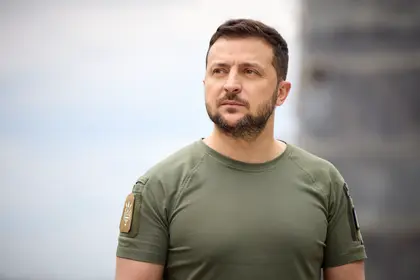Catapulted into a war he didn’t start, Volodymyr Zelensky is now left with little choice but to prevail militarily against Russia, analysts told AFP.
Having denied President Vladimir Putin a quick victory, the Ukrainian leader has no appetite to negotiate as the conflict looks set to drag on.
JOIN US ON TELEGRAM
Follow our coverage of the war on the @Kyivpost_official.
Here is a summary of key challenges ahead for Zelensky as his future plays out on the battlefield:
– Take back territory –
For the first few weeks of Russia’s invasion, Zelensky appeared ready to negotiate, but the situation has now evolved into a war of attrition at great cost in terms of soldiers’ lives and military hardware.
“He is convinced that the war must follow its course, that he has his weapons, and that the Russians have their weaknesses,” said Elie Tenenbaum at the IFRI French institute for international relations.
“He was willing to make concessions in the beginning because he was very scared, but now he’s gotten into the swing of things,” Tenenbaum said.
“The concept is clear,” said William Taylor, a former US ambassador to Ukraine and currently at the US Institute of Peace. “He stops the momentum, he counter-attacks and he pushes back towards the disposition on the 24th of February,” the day that Russia invaded.
This would dovetail with a statement by Ukrainian defence minister Oleksiy Reznikov to British daily The Times that he still has “a million” soldiers to throw into battle.

EXPLAINED: What We Know About Russia’s Oreshnik Missile Fired on Ukraine
“The political decision on a counteroffensive has already been made,” said Ukrainian political analyst Anatoliy Oktysyuk. “The campaign for the liberation of the occupied territories has already begun.”
– Wear the enemy down –
The Ukrainian army has shown that it will only retreat when there is no other option, like in Severodonetsk and Lysychansk in the east where they resisted the Russian army as long as possible.
“Ukrainians made them pay for that land pretty hard,” said a senior US defence official who asked not to be named.
Both sides appear to believe that time is on their side, said Ivan Klyszcz, a researcher at the Tartu university in Estonia.
One side must be miscalculating and that will be the side “least capable of sustaining the type of demands that the war is imposing”, he said.
The warring neighbours also know that logistics is key, and they are trying to cripple each other’s supplies, such as when Ukraine claimed a hit on a Russian munitions depot in the occupied southern Kherson region.
– Protect his aura –
Zelensky, a former TV personality, was a controversial figure in Ukraine before the war.
“Reforms weren’t getting done .. and there were all kinds of political intrigues,” said Angela Stent, an expert on Western relations with Russia at the US-based Brookings Institution.
But since, she said, he has turned into a “very effective wartime leader, obviously using all the skills he has learned as a comedian and a TV actor to communicate well”.
Keeping this image up is crucial for Zelensky’s future standing, analysts said, even in the face of rising pressure which observers said seems to have little impact on his energy levels.
“I haven’t seen any indication that it’s wearing him down,” said Taylor.
“He’s doing a brilliant job. By all accounts, the strength that he has is his tie to the Ukrainian people,” he said.
Klyszcz agreed, saying there were no reports of Zelensky “breaking down mentally, emotionally or physically in the last few months”. Instead he was projecting an image of “a decisive leader who is focused and committed to win the war”.
– Preserve Ukrainian unity –
Despite the deaths, the deprivations and the fear in the Ukrainian population, the nation’s unity is holding, and there appears little public support for negotiations with Moscow.
“That’s not to say it won’t happen,” said Taylor. “There has to be a limit to how much pain they can take.”
For now, he observed, “they haven’t hit it yet”.
Should cracks appear in Ukraine’s united front, it will most likely be because of disagreements between those who reject all territorial concessions, and those who don’t.
For now, any calls for negotiations “could only be promoted by pro-Russian forces in Ukraine” who are “on the sidelines” of Ukrainian politics, said Oktysyuk
But opinions could shift as the conflict wears on.
“The cost of the war has become more evident for the Ukrainian population,” said Klyszcz, adding that any major setback on the battlefield or tactical error could bring talk about compromise out into the open.
– Keep the west on side –
The war has deepened relations between Ukraine and Western governments, with Kyiv even obtaining candidate status to join the European Union.
Zelensky’s message to his Western allies “is that he’s fighting for us. He’s making this point over and over, and I’m sure he believes it”, Taylor said.
But analysts suspect he also knows that Western support will only last as long as his resistance on the battlefield.
“If Ukraine is able to conduct a successful offensive with Western arms, then many would be encouraged by the prospect than Ukraine can take back some territory,” said Michael Kofman, at CNA, a US think-tank.
But if not, “many people would be disappointed or perhaps disheartened and would assume that even with substantial supply of Western arms and equipment, Ukraine’s best option is to seek to regain its territory at the negotiating table rather than the battlefield”, he said.
You can also highlight the text and press Ctrl + Enter






